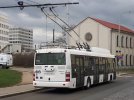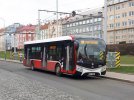superkev
Established Member
Hi. Living in the Pennines I've often wondered how the current electric buses would fare on some of my local routes. As far as I can see they only seem to be deployed on the flatlands of Leeds, York, Manchester etc.
I'd love to see how they faired on the 1000ft Queensbury hump between Halifax and Bradford or the long limb from Halifax to Ainley top.
K
I'd love to see how they faired on the 1000ft Queensbury hump between Halifax and Bradford or the long limb from Halifax to Ainley top.
K
Last edited by a moderator:



